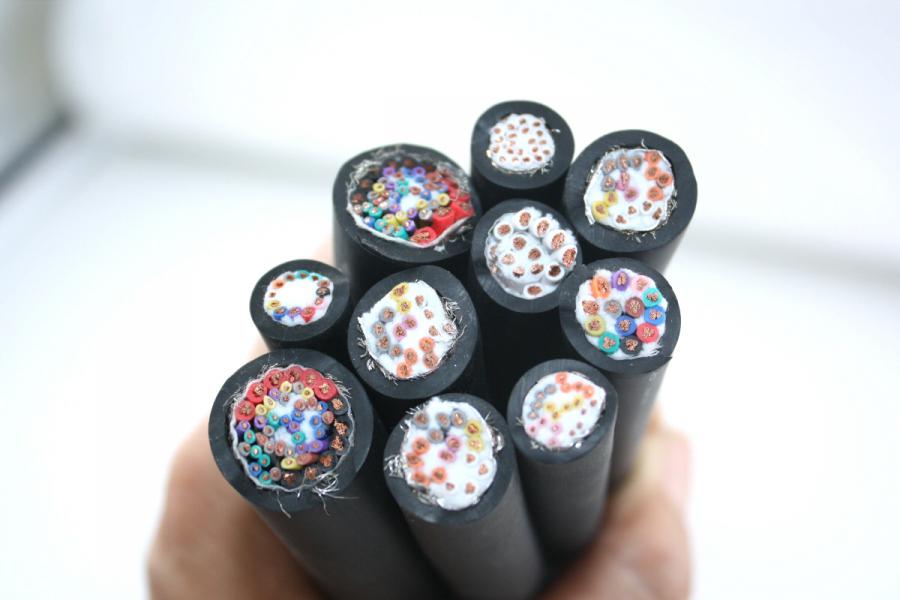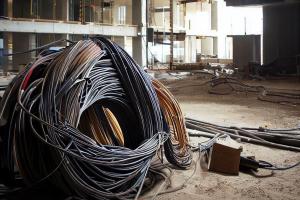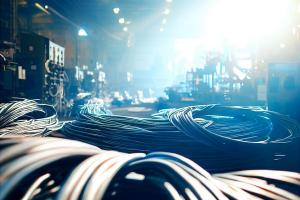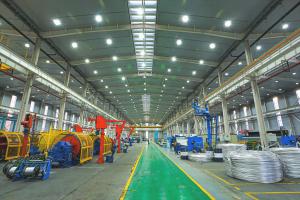
The Promising Future of Special Cables: Meeting Growing Demands Across Industries
Explore the dynamic world of special cables, their diverse applications, and the accelerating demand driving the industry's growth.
NEW YORK CITY, NEW YORK, UNITED STATES, May 30, 2023/EINPresswire.com/ -- The global demand for high-quality special cables is poised to soar in the coming years, propelled by advancements in industries such as shipbuilding, rail transportation, clean energy, aerospace, petrochemicals, and new energy vehicles. The special cable market is expected to be worth more than $22 trillion by 2023, growing at a CAGR of more than 10.3%.
What Is a Special Cable?
Special cables are a distinct category of cables designed to meet specific requirements and operate under specialized conditions. Unlike ordinary cables that have broad applications, special cables are developed for unique purposes and tailored to specific industries. They offer advanced features, specialized materials, and innovative designs to cater to demanding environments and complex technical needs.
1. Low-noise Cables
Special cables can be classified into various types based on their specific characteristics and applications. One such category is low-noise cables, which are commonly used in fields such as medicine, industry, and defense. These cables are engineered to measure tiny signals accurately and detect low levels of noise interference. They are crucial in sensitive applications where precise signal transmission and reception are essential, such as medical equipment, scientific instruments, and defense systems.
2. Fire-resistant Cables
Another category of special cables comprises functional customized cables. These cables are designed to possess specific properties and capabilities to meet particular needs. For example, fire-resistant cables are engineered to withstand high temperatures and prevent the spread of fire. They are extensively used in buildings, tunnels, and other fire-prone environments to enhance safety measures and minimize fire hazards.
3. Waterproof Cables
Waterproof cables are another type of functional customized cables. They are designed to resist moisture and ingress, making them ideal for applications in wet or submerged environments. These cables find extensive use in underwater equipment, marine systems, and outdoor installations exposed to harsh weather conditions.
4. Special armored Cables
Special armored cables are engineered with added protection, such as robust armor or reinforced sheathing, to withstand mechanical stress, impacts, and harsh environments. They are widely employed in industries such as mining, construction, and heavy machinery, where cables are subjected to rugged conditions and need enhanced durability.
5. Flexible Cables
Flexible cables are designed with superior flexibility and bendability to suit applications that require frequent movement or bending. They are commonly used in robotics, automation systems, and machinery where cables need to withstand continuous motion without compromising performance.
6. Ant-proof Cables
Ant-proof cables are specialized cables designed to resist damage caused by insects, particularly termites. These cables feature coatings or materials that are resistant to termite infestation, making them ideal for applications in industries such as agriculture, forestry, and building construction in termite-prone regions.
7. Eco-friendly Cables
Furthermore, special cables also include series of products that cater to emerging needs and environmental concerns. New environmentally friendly cables are designed with eco-friendly materials, reduced toxicity, and improved recyclability to align with sustainability goals. These cables address the growing demand for greener solutions across industries and contribute to reducing environmental impact.
Application Industries of Special Cables
Special cables find extensive application across diverse industries, providing critical solutions to meet specific requirements and ensure operational safety. These industries rely on the unique characteristics and advanced technology of special cables to enhance performance, durability, and efficiency in their operations. Let's explore some of the key industries that heavily rely on special cables:
1. Petrochemicals
The petrochemical industry requires special cables to withstand harsh environments, chemical exposure, and high temperatures. Special cables are used in oil refineries, chemical plants, and other petrochemical facilities for various applications, including power distribution, control systems, instrumentation, and communication. These cables ensure reliable and safe operations in hazardous areas and critical processes.
2. Metallurgical Machinery
Metallurgical machinery industries, including steel production, aluminum smelting, and foundries, depend on special cables for their demanding operations. These cables are engineered to withstand extreme temperatures, chemical exposure, and mechanical stress. They are used in furnace systems, smelting equipment, casting machines, and other critical components, providing reliable power transmission, control, and data communication.
3. Real Estate Construction
Special cables play a vital role in the construction sector, ensuring safety and reliability in high-rise buildings, residential complexes, and commercial structures. Fire-resistant cables are extensively used to prevent the spread of fire and ensure emergency systems remain operational. Additionally, cables with high-temperature resistance, low-smoke emission, and halogen-free properties are deployed to enhance safety standards and minimize risks in case of fire incidents.
4. Information Communication
The information communication industry heavily relies on special cables for high-speed data transmission, signal integrity, and network reliability. Fiber optic cables, a type of special cable, are widely used for long-distance telecommunications, data centers, and broadband networks. These cables offer superior bandwidth, low signal loss, and immunity to electromagnetic interference, ensuring efficient and secure data transmission.
5. Automotive
Special cables are essential in the automotive industry, where they are used in various applications, including wiring harnesses, engine components, sensors, and communication systems. Automotive cables need to withstand harsh conditions, vibrations, and extreme temperatures. They provide reliable connectivity, signal transmission, and power distribution in vehicles, contributing to overall performance, safety, and functionality.
6. Maritime
The maritime industry, encompassing shipbuilding, offshore platforms, and underwater operations, relies on specialized cables to ensure safe and efficient operations at sea. Marine-grade cables are designed to withstand saltwater corrosion, mechanical stress, and harsh weather conditions. They are used for power transmission, navigation systems, communication equipment, and control systems, ensuring reliable and uninterrupted connectivity in maritime environments.
7. Aerospace
In the aerospace industry, special cables are critical for aircraft and space vehicle applications. These cables must meet stringent requirements for weight reduction, high-temperature resistance, low outgassing, and space-saving designs. They are used for flight control systems, cabin wiring, avionics, communication systems, and engine components, ensuring reliable performance in extreme operating conditions.
8. Clean Energy
The clean energy sector, including solar power, wind power, and hydropower, relies on special cables for efficient power generation, distribution, and monitoring. Photovoltaic cables are used in solar energy systems to connect solar panels and inverters, while cables designed for offshore wind farms ensure reliable transmission of electricity from wind turbines to onshore grids. Special cables also support hydropower generation by enabling efficient power transmission in hydroelectric plants.
These industries represent a fraction of the wide-ranging applications of special cables. Other sectors such as defense, medical equipment, railways, mining, and industrial automation also heavily rely on specialized cables to meet their unique requirements and ensure safe and efficient operations.
Trends of Special Cables
The special cable industry is witnessing significant trends that are shaping the future of cable technology and its applications. As industries evolve and embrace advanced technologies, the demand for specialized cables is experiencing a surge. Let's explore some of the key trends in the development and application of special cables:
1. Increasing Demand for High-End Products
The demand for high-end special cables is rapidly growing across industries such as shipbuilding, rail transportation, clean energy, aerospace, petrochemicals, and new energy vehicles. These sectors require cables with superior performance, durability, and specific features to meet their unique demands. As technology advances and applications become more sophisticated, the need for specialized cables capable of withstanding extreme conditions and delivering precise performance is on the rise.
2. Technological Advancements and Complex Designs
Special cables are undergoing continuous technological advancements and more complex designs to meet evolving industry requirements. As industries demand higher performance and efficiency, special cables are incorporating new materials, structures, processes, and design calculations. Advanced manufacturing techniques are being employed to enhance cable performance, reduce costs, and increase profitability. The use of innovative materials, such as fiber optics and environmentally friendly compounds, is also driving the development of special cables with improved capabilities.
3. Emphasis on Environmental Sustainability
With increasing global focus on environmental sustainability, the special cable industry is responding by developing eco-friendly cables and reducing the environmental impact of cable production. New environmentally friendly cables are being designed with reduced toxicity, improved recyclability, and the use of sustainable materials. These cables align with the growing demand for greener solutions and support industries' efforts to reduce their carbon footprint and promote sustainable practices.
4. Growth in Smart Grid and New Energy Sources
The promotion of smart grid construction and the development of new energy sources are driving the demand for special cables. Governments and investors are providing strong support to sustainable, environmentally friendly, and clean energy projects, favoring the use of specialized cables. High-tech cables, including mining cables, photovoltaic cables, and ultra-high-voltage cables, are in high demand as the energy sector shifts towards renewable sources. The rapid growth of offshore wind power installations is also fueling the need for special cables designed for wind power applications.
5. Urban Rail Transportation
The expansion of urban rail transportation systems, such as metros and light rail, presents significant growth opportunities for the special cable industry. These transportation networks rely on specialized cables for power supply, control systems, signaling, communication, and safety features. As urban rail networks continue to expand globally, the demand for special cables catering to the specific needs of this sector will continue to rise.
6. Integration of Automation and Internet of Things (IoT)
The integration of automation and IoT technologies across industries is driving the demand for special cables capable of supporting these advanced systems. Special cables are required to provide reliable connectivity, data transmission, and power distribution in automated manufacturing processes, smart homes, and interconnected devices. The increasing adoption of IoT devices and the need for seamless communication between various systems are fueling the development of specialized cables with enhanced capabilities.
7. Growing Importance of Data Centers
Data centers play a critical role in storing, processing, and transmitting vast amounts of data. Special cables, particularly fiber optic cables, are essential components of data center infrastructure. The increasing demand for high-speed data transmission, low latency, and reliable connectivity in data centers is driving the need for specialized cables capable of meeting these requirements. The growth of cloud computing, edge computing, and other data-intensive technologies is contributing to the rising demand for specialized cables in this sector.
8. Focus on Safety and Compliance
Industries are placing a significant emphasis on safety standards and compliance with regulations. Special cables designed to meet specific safety requirements, such as fire-resistant cables, are in high demand.
Opportunities for Special Cable Manufacturers
With the growing demand for special cables, efficient product delivery becomes a critical focus for the industry in 2023. To address this challenge, cable companies must embrace new technologies and advanced manufacturing processes to optimize supply chain flow, meet market demands, shorten delivery times, and enhance overall efficiency.
The year 2023 is set to witness a wave of technological advancements in the special cable industry. Manufacturers are expected to adopt more advanced manufacturing technologies for cable processing, leading to improved cable performance, cost reduction, and increased profitability. Automation and human-machine interface technologies will be strengthened to enhance production efficiency and ensure the quality of raw materials.
Amidst the promising prospects of the special cable industry, companies like ZMS Cable are diligently focusing on technological research and development, fostering innovation, building strong brands, and safeguarding patents. These efforts enhance the core competitiveness of their products and contribute to the overall development of the special cable industry.
Summary
The future of special cables shines bright, driven by the rising demand from industries such as shipbuilding, rail transportation, clean energy, aerospace, petrochemicals, and new energy vehicles. Special cables, with their unique characteristics and applications, are becoming increasingly vital in various sectors, ensuring operational safety and efficiency.
The industry is witnessing a shift towards high-end products, complex technologies, and increased environmental consciousness. Governments and investors are actively supporting sustainable, clean energy projects, further propelling the demand for special cables.
Manufacturers in this domain have opportunities to excel by focusing on technological advancements, implementing advanced manufacturing processes, and enhancing product delivery efficiency. As the market continues to evolve, special cable companies can leverage innovation, brand-building, and patent protection to enhance their core competitiveness and contribute to the industry's development.
In conclusion, the future of special cables is bright, offering tremendous potential for manufacturers to thrive in an increasingly demanding and evolving market.
ZMS Cable
ZMS Cable
+86 371 6782 9333
info@zmscable.es
Visit us on social media:
Facebook
Twitter
LinkedIn
YouTube
Distribution channels: Electronics Industry, Energy Industry, Manufacturing, Technology, Telecommunications
Legal Disclaimer:
EIN Presswire provides this news content "as is" without warranty of any kind. We do not accept any responsibility or liability for the accuracy, content, images, videos, licenses, completeness, legality, or reliability of the information contained in this article. If you have any complaints or copyright issues related to this article, kindly contact the author above.
Submit your press release




